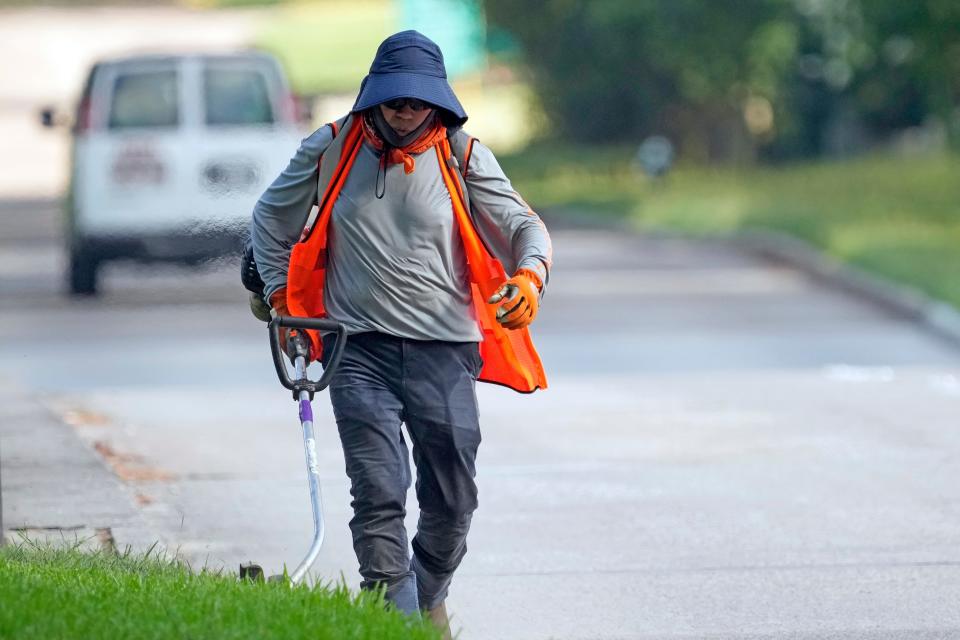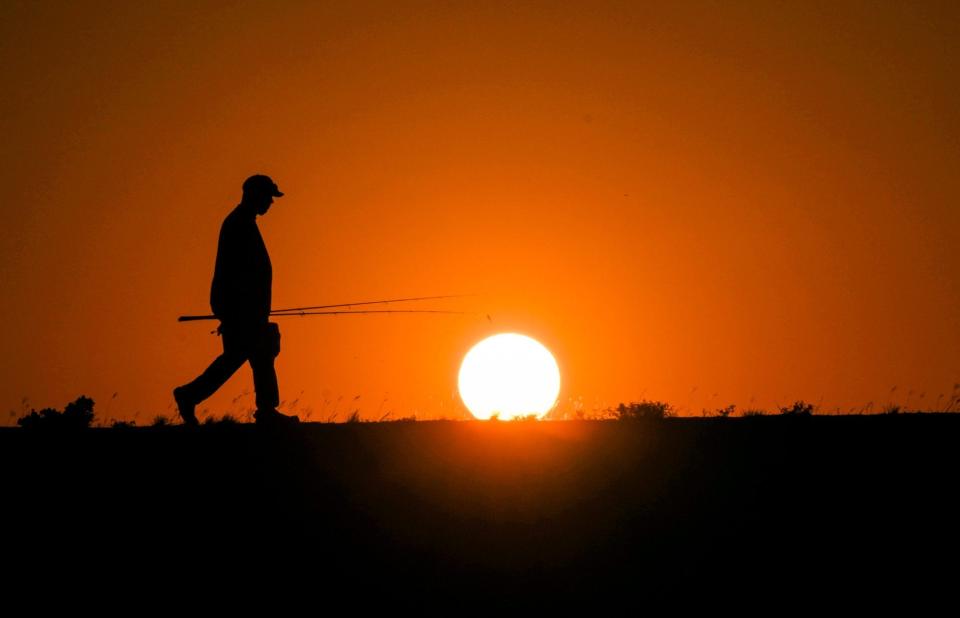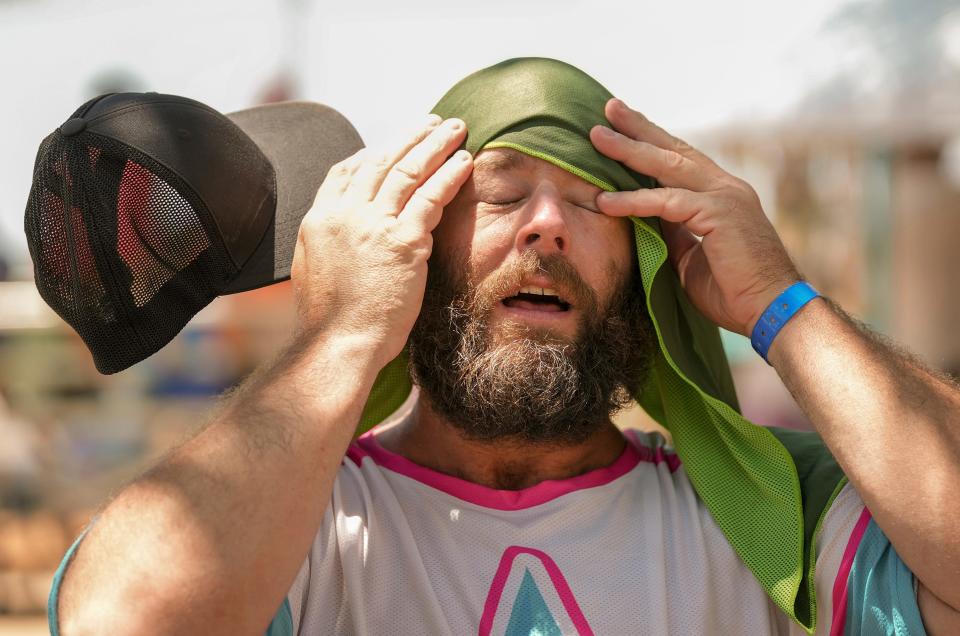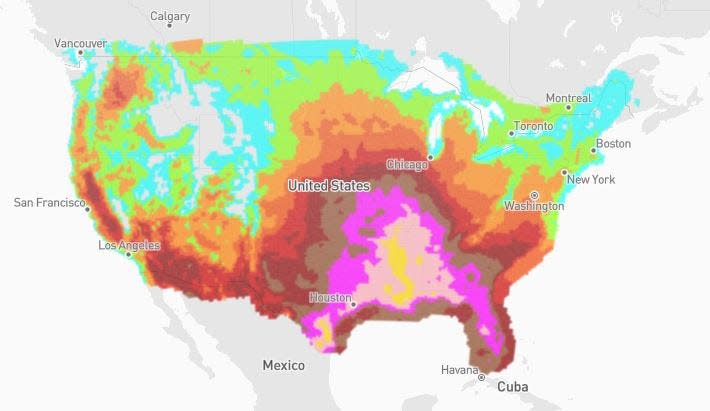After workers' heat deaths, Texas cities required water breaks. A new law takes that power away.
For eight hours on Wednesday, Juan Pedro Muñoz Olvera worked in the searing Texas heat, building new homes in the state capitol of Austin as the heat index reached 115 degrees.
Less than 24 hours earlier, Texas Gov. Greg Abbott signed a sweeping new law that will eliminate local rules mandating water breaks for construction workers like Muñoz.
Though Muñoz, 45, said he has successfully convinced his bosses to give him and his co-workers 10-minute water breaks every hour during extreme heat, he worries that Abbott’s latest action will open the door to potentially deadly abuses.
“It was super, super hot today,” he told USA TODAY in Spanish. “Bosses change.”

A spokesman for Abbott said in a statement that “ensuring the safety of Texans is a top priority as our state experiences high summer heat.”
“This bill maintains the federal Occupational Safety and Health Administration’s (OSHA) standards to keep workers safe and will not inhibit people from taking water breaks,” the statement said.
Here’s what you need to know about the bill Abbott signed this week and what that means for workers in Texas and beyond:
What does the law signed by Abbott do?

The law Abbott signed on Tuesday does far more than nullify requirements in Austin and Dallas to provide water breaks to workers.
Passed in April by the Texas Legislature, HB 2127 takes aim at numerous local regulations, stripping away the power of cities and towns to pass or enforce ordinances involving nine broad areas of Texas law, including:
Business and Commerce
Occupations
Property
Insurance
Agriculture
Essentially, if something is already Texas law, cities or counties can't pass or enforce anything to the contrary. If they do, the law opens them up to lawsuits.
"The purpose of this act is to provide regulatory consistency across this state and return the historic exclusive regulatory powers to the state where those powers belong," the law says.
Supporters argue that the law will eliminate a patchwork of various municipal regulations that only create confusion. Critics, who've dubbed the law "the Death Star bill," say the move was a thinly veiled attack on Texas' more liberal cities and their progressive measures.
With Abbott's signature on Tuesday, the law to go into effect on Sept. 1.
Worker protections

Dallas and Austin have each passed ordinances requiring employers give construction workers a minimum of 10-minute water breaks every four hours. San Antonio was considering a similar measure.
Dallas' ordinance came in 2015 following the death of 25-year-old Roendy Granillo in the Dallas area. Granillo was installing hardwood floors in a house without air conditioning on a sweltering summer day in 2015. Granillo told his co-workers that his hands were cramping up and he was filling sick; they later found him lying on a bedroom floor, and he later died at a hospital, where his body temperature was 110 degrees.
According to OSHA reports, Granillo had no water, didn't take breaks and kept working even though he wasn’t feeling well. OSHA fined Granillo's employer $30,000 for failing to keep the worksite free of hazards and for not having a medical plan in place for emergencies.
There were 436 work-related heat deaths in the U.S. between 2011 and 2021, according to the U.S. Bureau of Labor Statistics. The number is likely an undercount because of the way some deaths are classified if there are other contributing factors.
Of those deaths, 42 were in Texas, making it the state with the most heat deaths in the U.S.
Texans desperately need ordinances like the ones in Austin and Dallas to ensure worker safety, said Daniela Hernandez, state legislative coordinator with the Workers Defense Project.
"There has to be accountability and an enforceable standard," she said. "Proponents of the bill kept saying, 'Oh, it's just impossible to keep up with all of these regulations.' We're just asking you to keep workers alive. And if you're already doing that, then great; a law saying so, whether it's at the state or federal or local level, shouldn't really bother you if you're already doing it."
OSHA's current safety guidelines provide workers with plenty of protection and the vast majority of employers are looking out for workers, said Geoffrey Tahuahua, a supporter of the new law and president of Associated Builders and Contractors of Texas.
"Saying that our job sites are going to be less safe because of this bill is blatantly false," he said. "We would challenge that, because again, our industry is really committed to the safety of our workers. That's something we take very seriously."
Nationwide

California, Oregon and Washington are the only states that have passed laws requiring employers to provide shade and water when temperatures soar. California became the first after four farm workers died of heat stroke in 2005.
Similar bills have been introduced in other states, including Texas, but have not passed.
Worker advocates say they're hoping that OSHA will finalize a national standard for heat safety, though they're not optimistic it will come soon.
"They're currently trying to develop safety standards, but it takes years for OSHA to get those standards approved and passed in place," she said. "Right now it is completely up to the employer if they want to give their worker a rest break. It's great when they do but for those who don't, then what protection do those workers have?"
Heat wave

Over 31 million people faced an excessive heat warning throughout the country on Wednesday, with temperatures over 115 degrees being recorded in parts of the U.S. by the USA TODAY Heat Index.
The highest temperatures forecast on Thursday are in Louisiana, Alabama and Mississippi, where temperatures could hit over 115 degrees across the region.
On Friday, more states are expected to experience temperatures of over 115 degrees, including Texas, Mississippi, Louisiana, Alabama and Arkansas.
To report a heat violation by your employer, call OSHA toll-free at 1-800-321-6742 (OSHA).
This article originally appeared on USA TODAY: Texas heat, worker deaths a concern as local authority reduced

